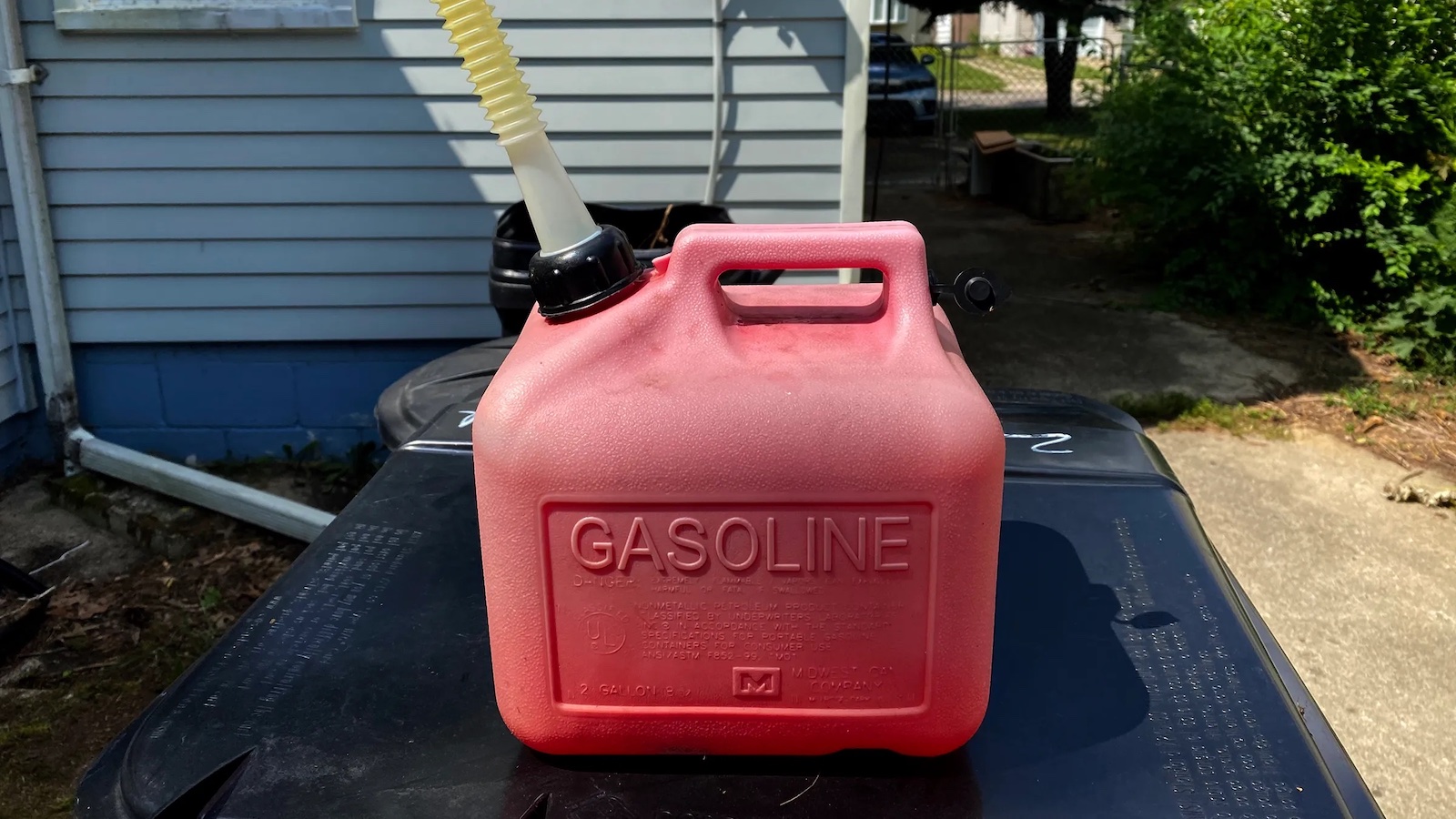
How Government Wrecked the Gas Can
It happened again but to tell the story I have to admit something a bit embarrassing. My gas meter on my car doesn’t work. I could get it fixed but it seems like a waste when I only need to calculate gas use carefully. I don’t always, which means I sometimes just run out, at inconvenient times.
This happened yesterday, so I had to get a can of gas from the local car shop. I started to pour it in. But, hmmm, this is strange. The nozzle doesn’t quite go in. I tilted it up and tried to jam it in.
I waited. Then I noticed gas pouring all down the side of the car. So I pulled it out and experimented by pouring it on the ground. There was some weird contraption on the outside and it wasn’t clear how it worked.
I poured more and more on the ground. Some got on my shoe. Some got on my hands. Some got on my suit.
Gas was everywhere really — everywhere but in the tank. It was a gassy mess. If someone had lit a match, I would have been a goner.
Finally I turned out the crazy nozzle thing a few times. It began to drip in a slightly coherent direction so I jammed it in. I ended up putting about one cup of gas in, started my car and made it to the gas station.
I’m pretty sure gas cans used to work. Yes. It was a can. It had a spout. It had a vent hole on the other side. You stuck in the spout and tipped. You never saw the gas.
Then government “fixed” the gas can. Why? Because of the environmental hazards that come with spilled gas. You read that right. In other words, the very opposite resulted. Now you cannot buy a decent can anywhere. You can look forever and not find a new one.
Instead you have to go to garage sales. But actually people hoard old cans. There is a burgeoning market in kits to fix the can.
The whole trend began in (wait for it) California. Regulations began in 2000, with the idea of preventing spillage. The notion spread and was picked up by the EPA, which is always looking for new and innovative ways to spread as much human misery as possible.
An ominous regulatory announcement from the EPA came in 2007: “Starting with containers manufactured in 2009… it is expected that the new cans will be built with a simple and inexpensive permeation barrier and new spouts that close automatically.”
The government never said “no vents.” It abolished them de facto with new standards that every state had to adopt by 2009. So for the last five years, you have not been able to buy gas cans that work properly. They are not permitted to have a separate vent. The top has to close automatically. There are other silly things now, too, but the biggest problem is that they do not do well what cans are supposed to do.
And don’t tell me about spillage. It is far more likely to spill when the gas is gurgling out in various uneven ways, when one spout has to both pour and suck in air. That’s when the lawn mower tank becomes suddenly full without warning, when you are shifting the can this way and that just to get the stuff out.
There’s also the problem of the exploding can. On hot days, the plastic models to which this regulation applies can blow up like balloons. When you release the top, gas flies everywhere, including possibly on a hot engine. Then the trouble really begins.
Never heard of this rule? You will know about it if you go to the local store. Most people buy one or two of these items in the course of a lifetime, so you might otherwise have not encountered this outrage.
Yet let enough time go by. A whole generation will come to expect these things to work badly. Then some wise young entrepreneur will have the bright idea, “Hey, let’s put a hole on the other side so this can work properly.” But he will never be able to bring it into production. The government won’t allow it because it is protecting us!
It’s striking to me that the websites and institutions that complain about government involvement in our lives never mentioned this, at least not so far as I can tell. The only sites that seem to have discussed this are the boating forums and the lawn forums. These are the people who use these cans more than most. The level of anger and vitriol is amazing to read, and every bit of it is justified.
There is no possible rationale for these kinds of regulations. It can’t be about emissions really, since the new cans are more likely to result in spills. It’s as if some bureaucrat were sitting around thinking of ways to make life worse for everyone, and hit upon this new, cockamamie rule.
These days, government is always open to a misery-making suggestion. The notion that public policy would somehow make life better is a relic of days gone by. It’s as if government has decided to specialize in what it is best at and adopt a new principle: “Let’s leave social progress to the private sector; we in the government will concentrate on causing suffering and regress.”
You are already thinking of hacks. Why not just stab the thing with a knife and be done with it? If you have to transport the can in the car, that’s a problem. You need a way to plug the vent with something.
Some boating forums have suggested drilling a hole and putting a tire stem in there and using the screw top as the way to close the hole. Great idea. Just what I wanted to do with my Saturday afternoon, hacking the gas can to make it work exactly as well as it did three years ago, before government wrecked it.
You can also buy an old-time metal can. It turns out that special regulations pertain here, too, and it’s all about the spout, which is not easy to fill. They are also unusually expensive. I’m not sure that either of these options is ideal.
It fascinates me to see how these regulations give rise to market-based workarounds. I’ve elsewhere called this the speak-easy economy. The government bans something. No one likes the ban. People are determined to get on with their lives, regardless. They step outside the narrow bounds of the law.
It wouldn’t surprise me to find, for example, a sudden proliferation of heavy-duty “water cans” in 1- and 5-gallon sizes, complete with nice spouts and vents, looking almost exactly like the gas cans you could get anywhere just a few years ago. How very interesting to discover this.
Of course, this law-abiding writer would never advocate buying one of these and using it for some purpose other than what is written on the package. Doing something like that would show profound disrespect for our betters in the bureaucracies. And if I did suggest something like that, there’s no telling the trouble that it would bring down on my head.
Ask yourself this: If they can wreck such a normal and traditional item like this, and do it largely under the radar screen, what else have they mandatorily malfunctioned? How many other things in our daily lives have been distorted, deformed and destroyed by government regulations?
If some product annoys you in surprising ways, there’s a good chance that it is not the invisible hand at work, but rather the regulatory grip that is squeezing the life out of civilization itself.
Free the People publishes opinion-based articles from contributing writers. The opinions and ideas expressed do not always reflect the opinions and ideas that Free the People endorses. We believe in free speech, and in providing a platform for open dialogue. Feel free to leave a comment.




Antoinette Sopocko
We still have some of the old, now illegal, gas cans. The company that made them was forced into bankruptcy by lawsuits from stupid people. Damn shame.
Next time, buy a gas can from a motorcycle shop. They have much better bottles, tall and round with very long nozzles and no safety features at all. Not sure how they get away from Federal regs, but now that I think about it, maybe I’d better buy a couple more before the Feds realize their oversight.
John Nigro
i hate this… Jack Spirko and Steven Harris have a wonderful podcast episode on storing gasoline that is somewhat related to this, and I believe they do touch on the annoying “improved” spouts. https://www.thesurvivalpodcast.com/harris-on-fuel-storage He uses blue 15 gallon storage drums though they are UNLAWFUL. This is difficult in NJ, however, because it is against the law to pump our own gas!
Michael Wagner
And here I thought it was only me.
I live on a boat and use a dinghy with an outboard engine to get to and from shore. I have a small outboard with a built in tank so I have to transfer gas into it every 3 or 4 days. Never had a problem with the old style cans. But these new “safer” cans spill gas EVERY TIME!
It you think you have a problem feeding gas to your car or lawnmower, try feeding gas to an outboard on a dinghy that’s bouncing on the water!
Caitlin Long
Jeffrey, you’re such a clever writer! Love this!!
Jeffrey A. Tucker
Thank you!
reel mower
I live on a boat and use a dinghy with an outboard engine to get to and from shore.I noticed my gas level was flat, too, and I didn’t want to force the mechanic to fill it up a bit, so I decided to use my trusty GAS CAN that I store in the back for emergencies.for reviews of best lawngears visit here https://lawngears.net/
Randall Chester Saunders
@libertariantreehugger
“… if we can stop acting like the internal combustion engine isn’t irreplaceable.”
Who’s “we?”
Why do so many so-called libertarians talk like collectivists?
Jeff Siegel
By “we,” I meant society as a whole.